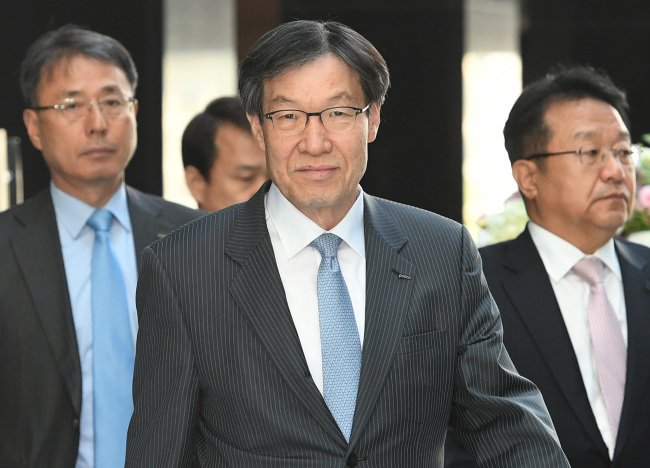The head of South Korea’s steel giant Posco, who has more than two years of his term left, abruptly offered to resign on Wednesday, amid rumors that his decision has been influenced by the intention of Cheong Wa Dae.
In a surprise decision, Posco Chairman Kwon Oh-joon said he was stepping down, citing his health. He said that he wishes to pass the baton to a “young and powerful” leader who he believes can bring the changes needed to the steelmaker that recently celebrated its 50th anniversary.
“I’ve been thinking that (Posco) should seek a change in CEO, among other things … and to deliver the command of the management to a person who is more passionate, capable, young and powerful than myself,” he told reporters after an emergency meeting of the board of directors.
 |
(Yonhap) |
“I told the board (members) about this and they approved it, gladly.”
Kwon’s decision instantly raised questions about Posco being under heavy political pressure despite its status as a completely private and global entity.
Founded as a state institution to build the nation’s steel industry in 1968, Posco was privatized in 2000. About 57 percent of Posco shares are owned by foreign investors, according to the company.
Despite the privatization, rumors have continued to follow Posco that it remains swayed by the political wind, most notably concerning its chiefs around the time of a new administration.
Kwon, a former lab researcher at Posco, was named chairman in 2014, when Park Geun-hye, the nation’s ill-fated former leader, was in power. Despite Park’s impeachment and her subsequent imprisonment over a high-profile bribery scandal, Kwon pursued a second term last year. Marking the vision for the next 50 years, the chairman also announced two weeks ago to diversify its business from steelmaking to bio and lithium-ion batteries.
Rumors of Kwon under pressure to resign have been circulating since Moon seized power in May. The chairman was excluded from the list of business delegates accompanying Moon for presidential trips overseas. Some suggested that the prosecution has begun an internal probe on Kwon, too. In 2016, Kwon was questioned by the prosecution over the scandal involving former President Park, as a witness.
Posco officials denied reports on the steelmaker facing political pressure, saying that Kwon was leaving the office because of his health.
“The chairman must have been exhausted after driving the three-year restructuring process,” said an official who declined to be named.
Kwon‘s resignation came coincidentally with the probe into KT Chairman Hwang Chang-kyu, who was interrogated by the police over allegations that he violated law on political funds. KT, like Posco, was launched as a public company and was privatized years later.
Meanwhile, Posco’s board of directors decided to initiate a process to find his successor, requesting its outside board members to make recommendations. The company is likely to hold a shareholders’ meeting to approve the board’s recommendation within two or three months.
Kwon’s sudden resignation appears to have little impact on Posco’s share price, as it rose 3.9 percent as of early afternoon. The steelmaker plans to announce its quarterly earnings on Tuesday. An insider said that the figures are robust.
Kwon is the eighth Posco chairman. All of Posco’s chairmen left their post before finishing their term.
By Cho Chung-un (
christory@heraldcorp.com)






![[Exclusive] Hyundai Mobis eyes closer ties with BYD](http://res.heraldm.com/phpwas/restmb_idxmake.php?idx=644&simg=/content/image/2024/11/25/20241125050044_0.jpg)
![[Herald Review] 'Gangnam B-Side' combines social realism with masterful suspense, performance](http://res.heraldm.com/phpwas/restmb_idxmake.php?idx=644&simg=/content/image/2024/11/25/20241125050072_0.jpg)
